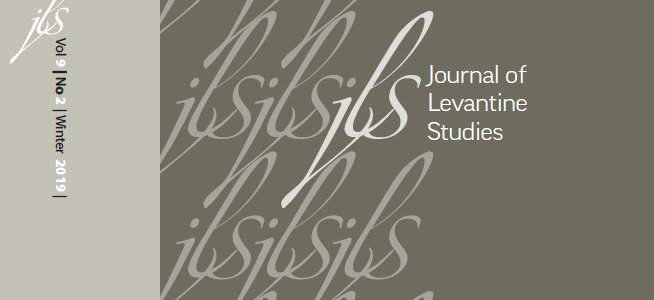-
 Add to cartQuick view
Add to cartQuick viewArabic Language among Jews in Israel and the New Mizrahi Zionism: Between Active Knowledge and Performance
Free!According to Command of Arabic among Israeli Jews, a report by Shenhav et al. (2015), the vast majority of the Jews in Israel neither speak nor understand the Arabic language. Proficiency in Arabic has declined dramatically with succeeding generations. While slightly more than half of the participants in the study believe that knowledge of Arabic is important, the majority of the participants also stated that its importance is security related. This bleak picture of Arabic as a vanishing language among Israeli Jews is related to the protracted ethnonational conflict, which has divided “Jews” from “Arabs.” This is in contrast to the recently expanding number of Jewish Israeli musicians, mostly of the third generation (the grandchildren) of migrants from Arab countries, who sing in Arabic and receive wide local and international exposure. In this article I examine the discrepancy between the low rates of proficiency and interest in the Arabic language and the growing number of singers and audiences in Israel who appreciate music sung in Arabic. I first summarize the findings of the report. I then examine Jewish Israeli musicians who perform in Arabic, focusing on Neta Elkayam and Ziv Yehezkel, to consider the possibilities of a cultural dialogue between Israeli musicians and local Palestinian, as well as regional, Arab audiences. I discuss the political significance of these performances, both in the context of Mizrahi identity among the third generation and in relation to local and regional Arab audiences. In the last section, I tie these musical performances to the policy of the right-wing government in Israel and the rise of a new Mizrahi Zionist discourse in relation to the Arabic language and culture. Finally, I point to the possible negative consequences of this cultural shift for Palestinians.
Add to cartQuick view -
 Add to cartQuick view
Add to cartQuick viewGendered Temporality and Space: Women in Translation from Arabic into Hebrew
Free!This article examines how women translators impacted the enterprise of translation from Arabic into Hebrew in the years 1876–2018. Their involvement is explored along three variables: genre, women’s literature, and Palestinian literature. The findings indicate a significant gender bias expressed by the low rates of women among authors and translators. At the same time, from 1978 onward we see a steady rise in the involvement of women in translation. Closer examination, however, reveals a more nuanced picture. Women’s impact on the enterprise of translation from Arabic into Hebrew does not end with the quantitative aspect; their power is rooted in the attempt to question the hegemonic values of the translation enterprise by questioning the male/gender and Zionist/national exclusivity of that enterprise.
The rise in the presence of women in the field of translation introduces three new trends. First, the preference of women translators for translating long works expresses an effort by women translators to position themselves in a central place in the translation enterprise. Second, the preference of women translators for translating works by Arab women is a conscious choice to raise women’s voices, which are repressed in both cultures. Third, the women translators, along with the Arab translators, contributed both to the placement of the repressed Palestinian narrative at the center of the translation field and to that narrative’s inclusion in the agenda of the translation enterprise.
Add to cartQuick view -
 Add to cartQuick view
Add to cartQuick viewIn This Ghetto for Which We Have Gathered
Free!Al-Lydd, in the ruins of a Mandate-era structure whose glory days have passed, now called “the Club,” the launch of Elias Khoury’s novel My Name is Adam: Children of the Ghetto, translated into Hebrew by Yehouda Shenhav-Shahrabani. Ustadh Ali, sitting in the audience, feels the earth cracking on the brink of the abyss along which he walks.
Add to cartQuick view -
Add to cartQuick view
JLS 9.2
Free!Add to cartQuick view -
 Add to cartQuick view
Add to cartQuick viewMaktoob in Action
Free!Add to cartQuick view -
 Add to cartQuick view
Add to cartQuick viewSamir Naqqash and His Polyglotic Literature in the Age of National Partition
Free!Against the backdrop of the national and colonial era and the rise of the monolingual national literature, this article explores Samir Naqqash’s literary work as a case study of multilingual writing in a monolingual literary reality, where there is a sharp gap between the language of the text and the expectations of the readership and its language. Through an exploration of Naqqash’s literary work, the article focuses on questions of multilingualism, translation, and literature along the borderlands of the modern Hebrew and Arabic languages and literatures. It examines the ways in which Naqqash’s work defies and resists the dominant nationalistic and monolingual trend in both Arabic and Hebrew literature and represents a unique and subversive poetic and linguistic model that blends spoken and literary languages, transcending the religious and national divide while simultaneously intersecting the different literary traditions from a wide geographical and cultural context, facing both East and West.
Add to cartQuick view -
 Add to cartQuick view
Add to cartQuick viewThe Khawaja
Free!Add to cartQuick view
- Home
- About JLS
- Issues
- Vol. 9 No. 1 | Summer 2019
- Vol 8 No 2 Winter 2018
- Vol. 8, No. 1: Summer 2018
- Vol. 7, No. 2: Winter 2017
- Vol. 7, 1: Summer 2017
- Vol. 6, Summer/Winter 2016
- Vol. 5, No. 2 Winter 2015
- Vol. 5, No. 1 Summer 2015
- Vol. 4, No. 2 Winter 2014
- Vol. 4, No. 1 Summer 2014
- Vol. 3, No. 2 Winter 2013
- Vol. 3, No. 1 Summer 2013
- Vol. 2, No. 2 Winter 2012
- Vol. 2, No. 1 Summer 2012
- Vol. 1, No. 2 Winter 2011
- Vol. 1, No. 1 Summer 2011
- Blog
- dock-uments
- Subscribe
- Submit
- Contact


